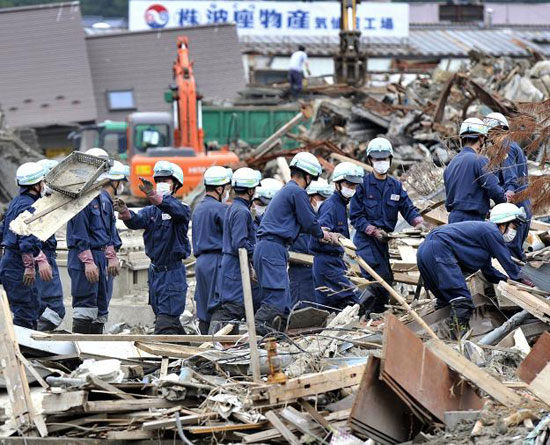Japan worries about earthquake alarms through slow television
Replacing the digital terrestrial analog transmission system made Japan anxious to warn the earthquake over television would be slower.

Overcoming the consequences of earthquakes and tsunamis in Miyagi Prefecture on June 18. (Source: AFP / VNA)
According to a reporter in Japan, since July, Japan will officially stop broadcasting the entire analog television system and switch to digital terrestrial broadcasting.
However, the main problem arises when the government has an urgent message about the imminent earthquakes that relate to the difference between digital terrestrial and analog systems.
In addition to the two major cities, Tokyo and Osaka, it is difficult for other locals to access the early warning information when an earthquake occurs.
According to disaster prevention experts, digital terrestrial news will report a 2-second early delay compared to analog and thus increase the risk of damage to people due to slow response to natural disasters.
Even in the case of investing in modern audiovisual equipment, it can only reduce the delay to 0.5 seconds.
Except for the three provinces that suffered heavy earthquakes (Iwate, Miyagi and Fukushima), 44 provinces and cities across the country had to completely switch to terrestrial digital systems.
Digital ground has the advantage of broadcasting with digital data for high-quality images, but therefore images and sound will be compressed when transmitting and require decompression equipment. Therefore, compared to analog systems, emergency earthquake warning displays will appear on the screen 2-3 seconds later.
An emergency earthquake warning is an early warning activity of a Japanese meteorological agency that usually takes a few seconds or a few dozen seconds before a strong vibration occurs.
If the epicenter is near the residence, the delay of 2-3 seconds becomes a major concern because the closer the vibration period is, the shorter the alert period.
- Japan was again shaken by the second earthquake
- Japan shook because of the earthquake
- Earthquake shook Japan
- Japan again shook because of the 6.1-magnitude earthquake
- Another 6.1 degree Ricter earthquake in Japan
- Great earthquake in Japan: 9 dead, nearly 900 injured
- A 10-meter tsunami hit Japan
- Warning earthquakes to every house
- Japan has a strong earthquake again
- The history of television development
- The 7.3-magnitude earthquake caused a small tsunami in Japan
- 30 earthquakes shook the island of Japan
 Is the magnetic North Pole shift dangerous to humanity?
Is the magnetic North Pole shift dangerous to humanity? Washington legalizes the recycling of human bodies into fertilizer
Washington legalizes the recycling of human bodies into fertilizer Lightning stone - the mysterious guest
Lightning stone - the mysterious guest Stunned by the mysterious sunset, strange appearance
Stunned by the mysterious sunset, strange appearance